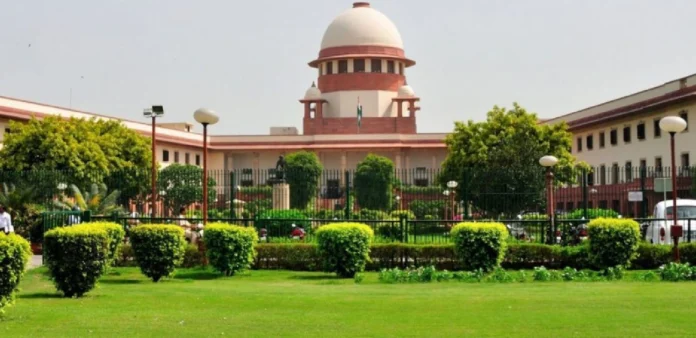By Dr Swati Jindal Garg
The Supreme Court has taken a decisive stand against a shocking judgment by the Allahabad High Court, which had ruled that the sexual assault of a minor girl—where the accused allegedly grabbed her breasts and tore the strings of her pyjamas while dragging her under a culvert—did not amount to rape or even an attempt to rape.
Expressing deep anguish, a bench of Justices BR Gavai and AG Masih remarked: “Some of the observations made in the impugned order… depict a total lack of sensitivity on the part of the author of the judgment… We are usually hesitant to grant a stay at this stage. But since observations in para 21, 24, and 26 are unknown to the tenets of law and show an inhuman approach, we stay the observations in said paras.”
The Supreme Court took suo motu cognizance of the Allahabad High Court ruling just a day after another bench of the top court had refused to entertain a similar writ petition filed by a third party following a public outcry. Issuing notices to the centre, the state of Uttar Pradesh, and the parties involved, the apex court pointed out that the High Court judgment had not been delivered in haste, but was pronounced after being reserved for four months—suggesting careful deliberation by the judge concerned.
The Incident And Legal Battle
The case dates back to January 2022, when a woman approached a POCSO court in Kasganj, Uttar Pradesh, seeking directions to the police to register an FIR against three men for rape and criminal intimidation. She alleged that while returning to her village with her daughter on November 10, 2021, two youths from her village offered to drop her daughter home on a motorbike. Trusting them, she allowed it. However, she later alleged that on the way, one of the men grabbed her daughter’s breasts while the other tore the strings of her pyjamas and dragged her under a culvert.
Their assault was interrupted when two men from the village, passing by in a tractor, heard the girl’s screams and intervened. The accused fled, but allegedly threatened the rescuers at gunpoint. When the girl’s mother complained to the father of one of the accused, he allegedly threatened to kill her, forcing her to approach the police. Shockingly, the police took no action, compelling her to move the courts.
The Kasganj POCSO court treated her application as a complaint and directed the police to register a case. The statements of the complainant and a witness were recorded, and the Court summoned the accused under Section 376 (rape) of the IPC and Section 18 of the POCSO Act (attempt to commit an offence). The father of one of the accused was also summoned under Sections 504 (intentional insult to provoke breach of peace) and 506 (criminal intimidation).
Allahabad HC Alters Charges, Reduces Offence
The three accused then moved the Allahabad High Court, where Justice Ram Manohar Narayan Mishra heard the case. Their defense argued that the rape allegations were fabricated to “settle scores” due to a prior dispute between the families.
The accused’s lawyer pointed out that the mother of one of the accused had earlier filed a molestation case against four men, one of whom was the uncle of the minor girl. This, he claimed, indicated that the rape allegations were a retaliatory measure.
After hearing the case, the High Court modified the charges, ruling that the offence of rape be altered to “assaulting or abusing with an intent to disrobe or compel her to be naked.” The Court observed: “The allegations levelled against the accused, Pawan and Akash, and facts of the case hardly constitute an offence of attempt to rape… To bring out a charge of attempt to rape, the prosecution must establish that it had gone beyond the stage of preparation.”
The judge opined that merely grabbing the victim’s breasts and tearing her pyjama strings did not establish a clear intent to commit rape. The Court further noted that the witnesses did not state that the accused had left the victim undressed. Consequently, the trial court in Kasganj was directed to re-issue fresh summons under Sections 354(b) IPC (assault or use of criminal force with intent to disrobe) and Section 9/10 of the POCSO Act (aggravated sexual assault).
The Legal Debate: Preparation Vs Attempt
At the heart of this case lies a crucial legal distinction—when does a crime transition from “preparation” to “attempt”? In criminal law, an act progresses through four stages:
1. Intention
2. Preparation
3. Attempt
4. Commission of the crime
A mere preparation to commit an offence is not punishable, but an attempt is. The Supreme Court has held in multiple cases that an attempt begins when all preparations are complete and the accused takes an irreversible step towards the commission of the crime. Even if the attempt fails due to external factors, it remains legally punishable.
In this case, the High Court ruled that the accused’s actions constituted only “preparation,” not “attempt,” which is why it altered the charges. However, whether this reasoning will stand remains uncertain as the matter is now before the apex court.
With the apex court’s intervention and strong words against the Allahabad High Court’s ruling, this case has ignited an intense legal and moral debate—one that will likely set a precedent in defining what truly constitutes an “attempt” to commit rape in India.
—The author is an Advocate-on-Record practising in the Supreme Court, Delhi High Court and all district courts and tribunals in Delhi


